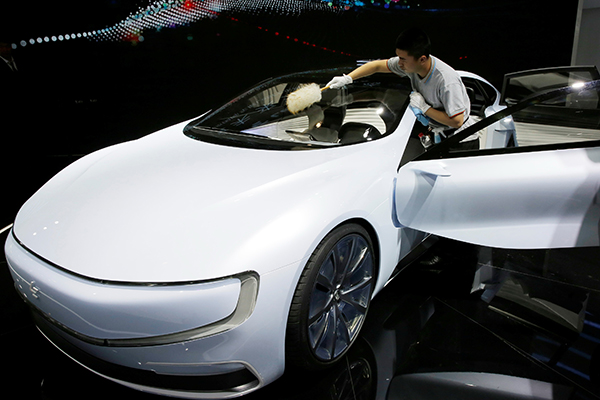

 |
|
A worker brushes off dust from a LeSEE all-electric battery concept car during Auto China 2016 in Beijing. [Photo/Agencies] |
Chinese tech major LeEco kicked off its $3 billion auto plant project in Deqing county, Zhejiang province, on Wednesday.
The ground-breaking ceremony marks the firm's bid to restore investor confidence that got dented by its cash-burning electric car initiative. LeEco had bought a 900,000-square-meter plot of land for 279 million yuan ($40 million).
Wednesday's start to the e-car plant work appears to indicate the privately held firm is confident about its financial situation, suggesting the cash crunch issue may have been blown out of proportion.
Zhang Hailiang, president of LeEco's automobile branch in China, said the car factory's first phase will cost 11 billion yuan. Upon completion, the plant's annual output capacity would be 400,000 e-cars.
Jia Yueting, CEO and founder of LeEco, said earlier this month that the firm plans to mass-produce e-cars as early as 2018, but did not disclose initial-stage volumes.
LeEco said it is still developing its first production car. But Faraday Future, the US-based e-car startup backed by Jia, will unveil its first production model at the Jan 5-8 Consumer Electronics Show in Las Vegas.
LeEco, which started in 2004 as a video-streaming service in the mold of Netflix Inc, diversified into the automobile sector in 2014. It released its first self-driving electric concept car in April this year. En route, it established its presence in smartphones, TVs, cloud computing and sports.
But, in October, LeEco found itself short of cash after expanding its business to India and the United States. In an internal letter, Jia had admitted the global expansion "has gone too far".
Investors in LeEco's listed arm, Leshi Internet Information and Technology Corp, criticized the e-car project, which has already cost the unlisted parent 10 billion yuan, as a finance-straining luxury.
On Wednesday, Leshi suspended trading in its shares, saying it was "in discussion with strategic investors in a deal which will exceed 10 billon yuan".
Lu Zhenwang, CEO of the Shanghai-based Wanqing Consultancy, said it is possible for LeEco to build an e-car factory within 18 months.
But concerns about its cash flow remain, Lu said, even though LeEco had assured earlier this month that it would resolve its cash flow crunch within three to four months.
"Producing cars is far more complicated than making smartphones. The faster an auto factory grows, the more resources firms will need to keep it running. It will take at least three to five years before enterprises generate any profit from a car factory," Lu said.
"It is highly difficult for a firm like LeEco to succeed in the cash-intensive sector because its core video-streaming business can't provide persistent capital support."